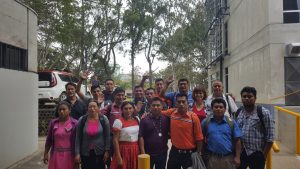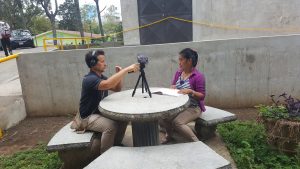In April, LTS faculty member and NILI Associate Director Robert Elliott travelled to Costa Rica to partner with the University of Costa Rica (UCR) in San José to offer 2 weeks of workshops for Indigenous language teachers.
Tell us about your experience. Who did you work with in Costa Rica?
In partnership with Professor Carlos Sánchez Avendaño of the UCR linguistics department, and Kara McBride of World Learning, the workshops were developed for 15 Indigenous language and culture teachers from 7 languages throughout the country of Costa Rica. The languages – Ngäbere, Buglere, Malecu, Bribri, Cabécar, Boruca, and Térraba – are in various states of endangerment, and the teachers work predominantly with middle-school aged children.
How were the workshops structured?
The workshop was divided into two parts and were loosely based on the model of NILI summer institute classes. The first week, the teachers received training in pedagogy in the morning hours while the afternoon was geared towards learning to use technology tools and generating ideas for making greatly needed language learning materials for their classes. The second week was centered around giving time and support for the teachers to build materials to take home to their communities and share new ideas with other teachers. On one of the last days, the group was able to visit Carlos’ “Languages of Costa Rica” university class, and the teachers all got to use some of their new techniques to teach his class a bit of their languages.
How do you think the workshop is relevant to LTS and future language teachers?
In some ways, we as language teachers are all in the same boat. We are all involved with promoting language, culture and opening people up to new world views. But having LTS faculty actively involved in minority and endangered language situations is fairly unique and adds to our program. First, we do have future teachers in the LTS program who are planning to teach less commonly taught languages and endangered languages and having faculty actively involved in these issues is important for these students. Further, all future language teachers should be aware of the effects of globalization and the extreme loss of smaller languages both in the Pacific Northwest as well as in the world at large. It is likely, for example, if you teach ESL in the US or Latin America, that you will have speakers of indigenous languages in your class and you may not even realize it. For much of the world, a language exists in a system of other languages, and while we have the ability to do much good as language teachers, opening doors to our students that would not otherwise exist, we also need to also be aware of our ability to do great harm, even unintentionally, particularly to smaller and fragile languages. We hope that all of our teachers leave the LTS program with a sensitivity towards these issues.
What else did you do there?
While the schedule was busy, not everything was all business all the time. In the evenings and weekends the group was able to visit different venues in and around UCR, such as the Insect museum at the university and the National Museum of Pre Columbian Gold in the center of San José.
The insect museum contained specimens of gigantic tropical bugs, and we were offered some freshly prepared cockroaches and larvae to sample – yum! The Pre-Columbian museum was described as bittersweet by one of the participants: very interesting but also a reminder of the difficult history indigenous people have endured in Costa Rica and the Americas. I was also able to sneak in some seriously needed beach and surfing time at one of the stellar surf spots in the country, and got lost in a tropical rain forest in the mountains one day. This was an invaluable experience, and I look forward to participating in more workshops for indigenous teachers in the future.




